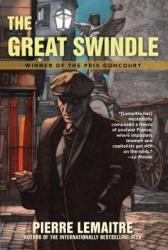Set in France in the aftermath of the First World War, THE GREAT SWINDLE is loosely a crime novel, owing to the fraud perpetrated as part of the ongoing action. What it really is, is an exploration of the treatment of returned servicemen, the damage - physical and mental - that war leaves in it's wake, and the similar damage societal pressure causes.
In what turned out to be a massive book (I was reading an ebook version of it and didn't twig to the size until well into the story), Lemaitre introduces the reader to the three main characters on the battlefront - in an apt and very discomforting series of scenes, set amongst an engineered charge against the Germans. One man desperately injured still finds it within himself to try to save a second. In the short, sharp and violent journey to that point, both have been betrayed. Lieutenant d'Aulnay Pradelle is determined to use the war to cement his place in a world that he resents. Engineering a charge by committing battlefield murder, Albert Maillard is the soldier who discovers Pradelle's deception, coming up against Pradelle's determination in a way that should have ended his life. Except for Edouard Pericourt, fellow soldier, talented artist, from a wealthy family, who despite his own horrendous injuries comes to the aid of the dying Maillard.
Maillard and Pericourt thereafter have a bond that cannot be broken, despite so many difficulties. Pericourt's injuries are so severe, and so shattering that Maillard becomes his carer, his champion and protector. He engineers Pericourt's change of identity and keeps the truth of his survival from his wealthy father and sister. Meanwhile Pradelle devotes himself to his ruthless attempts to save his own family name and fortune, and rise in society as he believes is his due. Needless to say circumstance is not done with these three.
Lemaitre choreographs an intricate dance for his main characters. The awfulness of war gives way rapidly to an awfulness of returning home. Maillard and Pericourt have the added complication of Pericourt's appalling injuries to deal with - but their situation is made even worse by the disregard of the society that they return to. There is no ongoing support or help, and Maillard must struggle to work, care for his charge, maintain the deception of his death from a grief stricken family, and combat the machinations of Pradelle - who frankly - is dangerous and manipulative. Add to that Pericourt's addiction to expensive pain killers which Maillard battles to source and pay for, and THE GREAT SWINDLE paints a picture of desperate times, and grand schemes to escape them.
The pace of this novel is interesting. It goes from rapid fire to almost languid. It shifts from the truly horrific to surprisingly mundane, and it deals with much that is grand and wide-ranging, and much that is domestic and trivial. It pulls people and circumstances into the orbit of the three main characters, deals with their impact and then sometimes moves on, and sometimes draws them closer. It moves quickly between the hardship and the friendship, between regret and regard. It also doesn't shy away from the nastier aspects of some people, and the despair and loneliness of others. It draws stark differences between the people who have money and power, but not necessarily peace, and those that have nothing and are equally unhappy.
Needless to say THE GREAT SWINDLE is a fascinating book. It's not universally uplifting and it's not overbearingly depressing. It is, however, unerringly clever.
The Great Swindle

The year is 1918, the war on the Western Front all but over. An ambitious officer, Lieutenant Henry D'Aulnay-Pradelle, sends two soldiers over the top and then surreptitiously shoots them in the back to incite his men to attack the German lines.
When another of D'Aulnay-Pradelle's soldiers, Albert Maillard, reaches the bodies and discovers how they died, the lieutenant shoves him into a shell hole to silence him. Albert is rescued by fellow soldier, the artist Edouard Pericourt, who takes a bullet in the face. The war ends and both men recover, but Edouard is permanently disfigured, and fakes his death to prevent his family from seeing him as a cripple. In gratitude for Edouard's rescue, Albert becomes the injured man's companion and caregiver.
Finding that the postwar gratitude for the soldiers' service is nothing more than lip-service to an empty idea, the two men scramble to survive, ultimately devising a scam to take money for never-to-be-built war memorials from small towns. Meanwhile, Lieutenant Pradelle has married Edouard's sister Madeline and is running a scam of his own that involves the exhumation of war victims.
Add comment